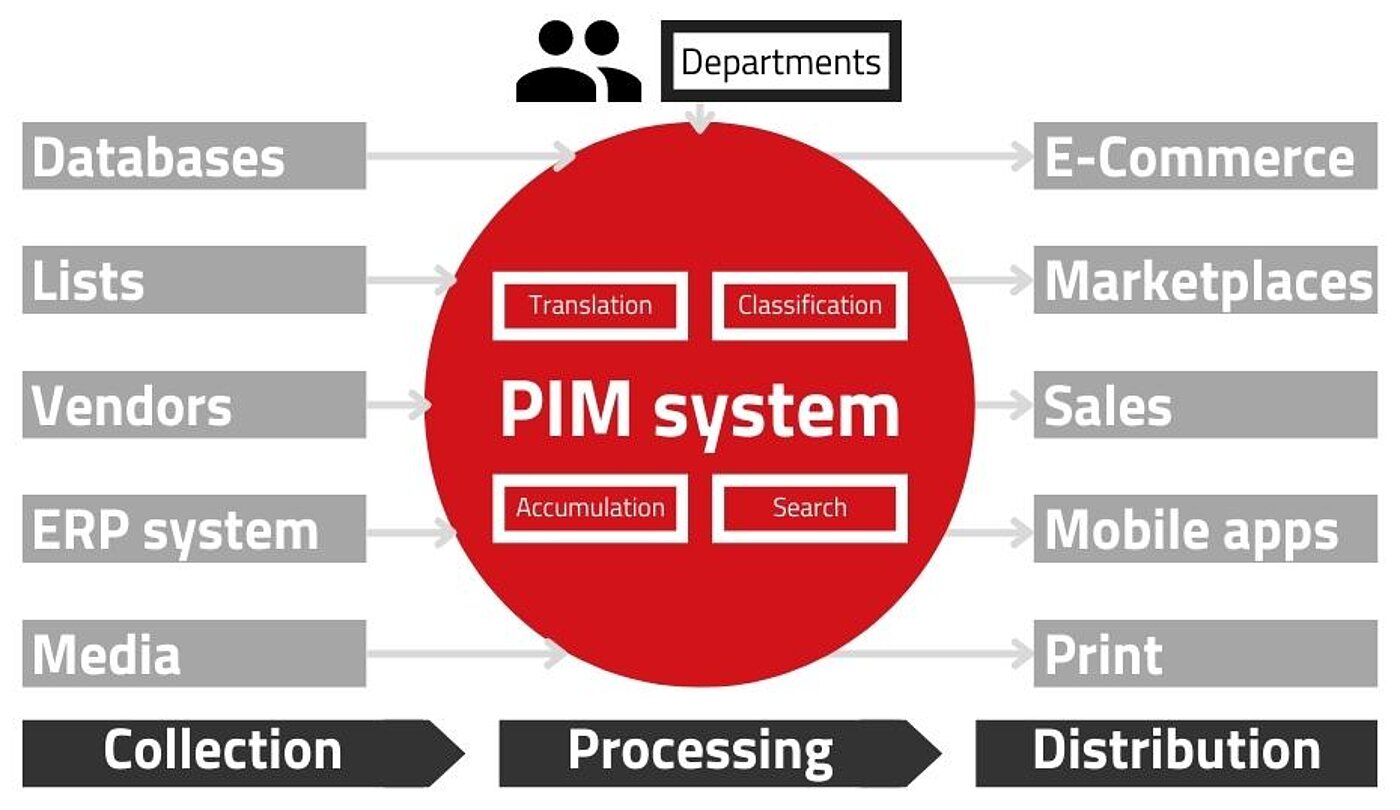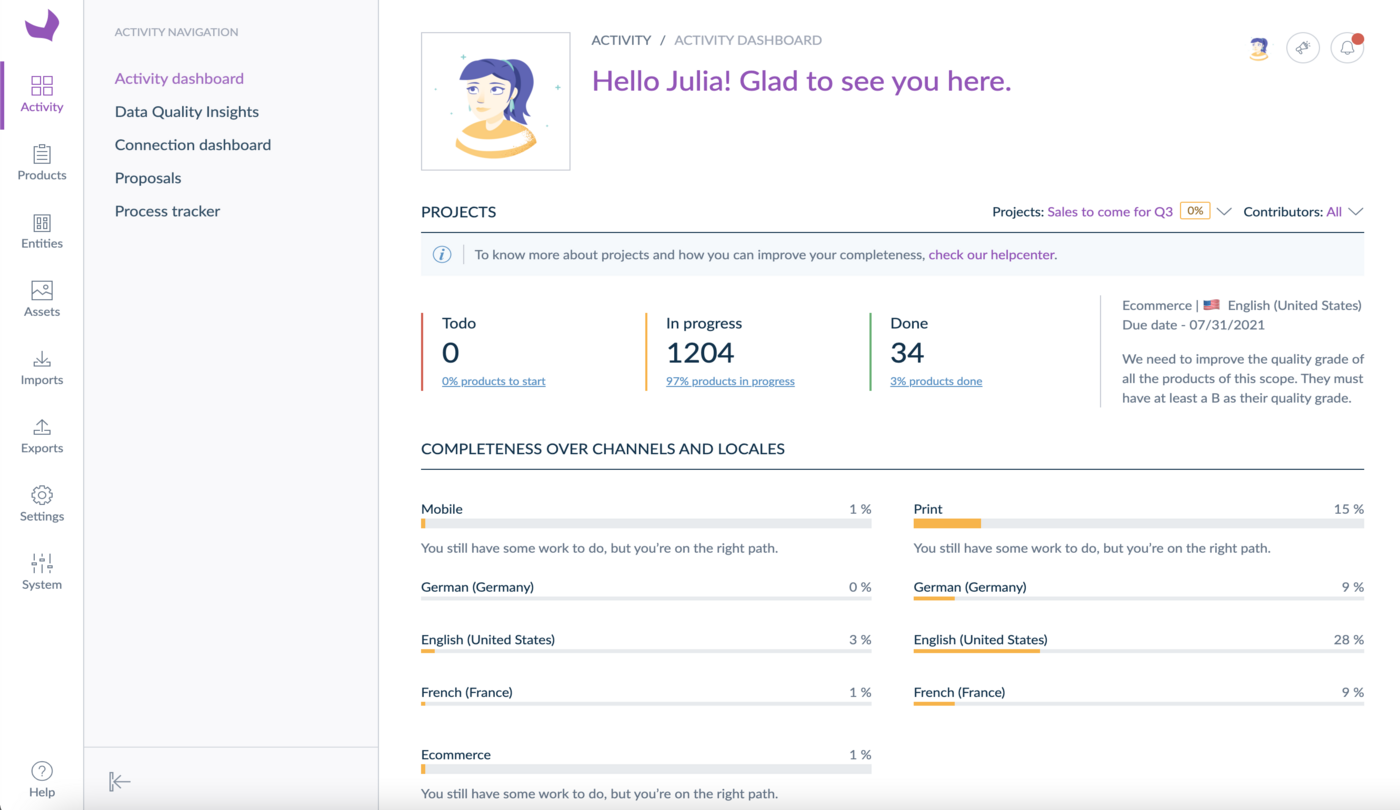
The continuous maintenance and synchronisation of data is an important basis for the efficiency of business processes. Those who still work with decentralised lists in e-commerce today and maintain the product data on the different channels by hand are quickly no longer competitive.
In this article, you will learn how a PIM system can support data consistency, what advantages the open source solution Akeneo offers and what requirements it brings with it in terms of hosting.
What does PIM mean?
PIM is short for Product Information Management and is a collective term for software solutions that are designed for the central control and management of a company's product data. In a PIM system, all data is collected that is relevant to the product in some form.
In addition to product data such as descriptions, product features, translations, images and tutorials, this also includes information from the areas of technology, marketing and logistics, for example. The purpose of PIM is therefore to simplify and accelerate work processes around product management.
How does a PIM system work?
In a PIM system, all product-relevant data is collected centrally, processed by the actors involved and distributed from there to all connected channels. The advantage of this is that the data is only held by the PIM system and the distribution channels no longer have to be maintained individually.
First, various data sources are linked to the PIM system so that this information can flow into the software automatically. This includes, for example, product information from local databases, supplier data, lists (e.g. Excel), data from the ERP system and multimedia content (images, videos and more).
The product data pool within the PIM system is fed from these data sources. Now the data can be processed within the system. This in turn includes the enrichment, classification or translation of data. In this way, continuous quality management is carried out by the actors and departments involved.
The data from the PIM system is distributed to an individual selection of channels via various interfaces. Which channels are used depends on the business model and strategy of the respective company. For example, e-commerce systems, mobile apps, online marketplaces, CRM systems (sales), print formats such as data sheets or product catalogues and much more are conceivable.
 Functionality of a PIM system | Graphic: maxcluster
Functionality of a PIM system | Graphic: maxcluster
For whom is a PIM system particularly worthwhile?
Regardless of the size of a company, the use of a PIM system is particularly useful if the company has an extensive product range and the product data must be continuously updated. This is the case, for example, with medium to large online shops.
A PIM system also brings great benefits when different sales channels are used or products are marketed internationally.
Advantages of a PIM system
Those who rely on the use of a PIM system benefit in particular from a reduced need for time resources, better data quality and a reduced susceptibility to errors.
Better data quality
All necessary data is extracted from relevant data sources and stored centrally in the PIM system. This way, representatives of different departments can access it as users from any location, organise data and optimise it for different distribution purposes. In addition, in many solutions it is possible to define for which data areas the authorised persons receive editing rights. In this way, it can be precisely structured which departments and stakeholders are responsible for which data sets and distribution channels.
Time saving
PIM systems reduce the time resources needed for data maintenance to a minimum. The manual maintenance of data in many decentralised lists is replaced by interface communication, centralisation and time-saving automation in the process. Manual intervention is usually only required when new data sources need to be captured and existing data records need to be processed.
Less susceptibility to errors
Due to the central storage of data and its automated transfer into the system, potential errors that could occur in the context of manual data management are avoided. Thus, a PIM system creates structure and transparency with regard to the storage and processing of product data. The formalised process ensures that all stakeholders involved are always on the same level and that clear responsibilities exist.
The risk of duplications arising, errors in data transfer or discrepancies between different departments in data processing is thus reduced many times over.
What is Akeneo?
Akeneo was founded in 2013 by Frédéric de Gombert, Benoit Jacquemont, Nicolas Dupont and Yoav Kutner and is headquartered in Nantes, France. The founders are renowned e-commerce experts from the Magento cosmos, Kutner was previously CTO of Magento. Akeneo specialises in the production of software in the areas of Product Information Management and Product Data Intelligence and is one of the world's leading solution providers in this sector.
Akeneo PIM business model
One of the company's core software solutions is Akeneo PIM, a PIM system available in three different editions. Akeneo PIM is technically based on the PHP framework Symfony.
The Community Edition is available free of charge under the open source licence "OSL V3". This edition already contains all the important functions of the solution, such as data collection, catalogue management, enrichment of product information and data export. In addition, any number of channels can be used and users can be created. On-premise hosting also enables flexible scaling of the hardware. Since SSH allows full access to Akeneo, flexible adjustments to the system are possible, in contrast to the commercial editions.
Those who need support can turn to a very active and helpful community consisting of over 3,000 members. There is support through regular updates, but these must be actively installed. In addition, new PIM functions are usually only available later.
Those who want to benefit from exclusive additional functions, SLA-based support and more can alternatively fall back on the Growth Edition, which is subject to a fee, or the fully comprehensive Enterprise Edition. Both are under proprietary licence and are provided as a "Software as a Service" (SaaS) solution. In contrast to the Community Edition, however, not as many users as desired can be created in the paid editions. Both packages contain a quota of 15 user accounts. More can only be set up for an additional charge. In addition, further costs are incurred for each channel created.
While the Growth Edition costs 25,000 US dollars in an annual subscription, the price of the Enterprise Edition is only available on individual request. However, on-premise hosting is not possible with these two editions. In addition, the hardware scaling is predefined here and cannot be adapted to individual needs.
Advantages of Akeneo in e-commerce
Along with PIMCore, Akeneo is one of the most frequently used PIM systems in e-commerce. For shop operators in particular, the solution brings with it a number of advantages.
- Akeneo PIM is Open Source: The open source code and the technical basis enable individual adaptations to one's own requirements with the right know-how.
- The use of Akeneo PIM leads to fewer returns: According to official data from the provider, the number of returns can be reduced by up to 40% when used efficiently.
- Technology partnership with Adobe Commerce: Akeneo is the only premium technology partner of Adobe Commerce in the field of PIM. Mit dem Akeneo Connector for Magento 2, Akeneo offers a native integration for synchronising product data between Akeneo PIM and online shops based on Magento 2.
- Synchronisations overnight: Imports, exports and synchronisations with online shops and marketplaces are carried out automatically overnight. This means that the productive operation of your online shop is usually not affected.
 The Akeneo dashboard at a glance | Source: Akeneo
The Akeneo dashboard at a glance | Source: Akeneo
Hosting Akeneo
If you are thinking about using the Community Edition of Akeneo, you should keep in mind both the hardware resource requirements and the technical requirements of the solution.
What to consider when hosting Akeneo?
An important aspect to consider when hosting Akeneo PIM is the number and size of hardware resources required. The concrete hardware requirements can be calculated on the basis of the individual product catalogue volume. To determine this volume, all product values, product categories and other attributes, such as languages or distribution channels, must be put in relation to each other.
Akeneo itself has created a formula for calculating the product catalogue volume, which can be found in the linked blog post.
Akeneo Hosting at maxcluster
The Community Edition of Akeneo PIM can be hosted at maxcluster in the versions Akeneo 4, Akeneo 5 and Akeneo 6. To operate Akeneo, maxcluster requires Ubuntu 20.4 or newer as the operating system and Apache 2.4 as the web server. Akeneo also requires PHP, MySQL and Elasticsearch or OpenSearch.
The following table shows which Akeneo version at maxcluster is compatible with which version of the software mentioned.
| Software | Akeneo 4 | Akeneo 5 | Akeneo 6 |
|---|---|---|---|
| Ubuntu | ≥ 20.4 (64 bits) | ≥ 20.4 (64 bits) | ≥ 20.4 (64 bits) |
| Apache | 2.4 | 2.4 | 2.4 |
| PHP | 7.3 | 7.4 | 8.0 |
| MySQL | 8.0.29 | 8.0.29 | 8.0.29 |
| Elasticsearch | 7.5 | 7.10 | ✗ |
| OpenSearch | ✗ | ✗ | 1.3 |
| NodeJS | ≥ 10.15 | ≥ 12.20 | ≥ 14 |
| Yarn | ≥ 1.0 | ≥ 1.0 | ≥ 1.22 |
You can find further information on the implementation and configuration of Akeneo in our Application Center in our related FAQ article.
Are you thinking about using Akeneo PIM and would like to find out more about hosting Akeneo at maxcluster? If you have any questions, please feel free to contact our technical support team by phone at 05251 4141 350 or by email at beratungmaxcluster.de. Our team is looking forward to your call or message.
Conclusion
A PIM system like Akeneo reduces time, costs and error-proneness in the maintenance and administration of product data. Especially in e-commerce, data consistency is an important basis for productivity and success. If the shop system is connected to the PIM system via an interface, product data can be updated continuously and automatically.
Those who rely on the PIM solution Akeneo benefit, for example, from the user-friendliness, which also excels when many players from different areas work in it. The multi-channel options of Akeneo are also advantageous if other distribution channels such as marketplaces or social media are to be used in addition to the online shop. Last but not least, the availability as open source offers a lot of flexibility and customisation options when using Akeneo.




